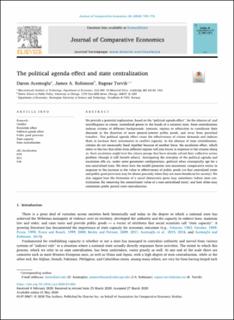| dc.contributor.author | Acemoglu, Daron | |
| dc.contributor.author | Robinson, James A. | |
| dc.contributor.author | Torvik, Ragnar | |
| dc.date.accessioned | 2021-02-23T12:56:56Z | |
| dc.date.available | 2021-02-23T12:56:56Z | |
| dc.date.created | 2021-02-03T09:30:46Z | |
| dc.date.issued | 2020 | |
| dc.identifier.citation | Journal of comparative economics. 2020, 48 749-778. | en_US |
| dc.identifier.issn | 0147-5967 | |
| dc.identifier.uri | https://hdl.handle.net/11250/2729832 | |
| dc.description.abstract | We provide a potential explanation, based on the “political agenda effect”, for the absence of, and unwillingness to create, centralized power in the hands of a national state. State centralization induces citizens of different backgrounds, interests, regions or ethnicities to coordinate their demands in the direction of more general-interest public goods, and away from parochial transfers. This political agenda effect raises the effectiveness of citizen demands and induces them to increase their investments in conflict capacity. In the absence of state centralization, citizens do not necessarily band together because of another force, the escalation effect, which refers to the fact that elites from different regions will join forces in response to the citizens doing so. Such escalation might hurt the citizen groups that have already solved their collective action problem (though it will benefit others). Anticipating the interplay of the political agenda and escalation effects, under some parameter configurations, political elites strategically opt for a non-centralized state. We show how the model generates non-monotonic comparative statics in response to the increase in the value or effectiveness of public goods (so that centralized states and public good provision may be absent precisely when they are more beneficial for society). We also suggest how the formation of a social democratic party may sometimes induce state centralization (by removing the commitment value of a non-centralized state), and how elites may sometimes prefer partial state centralization. | en_US |
| dc.language.iso | eng | en_US |
| dc.publisher | Elsevier | en_US |
| dc.rights | Navngivelse 4.0 Internasjonal | * |
| dc.rights.uri | http://creativecommons.org/licenses/by/4.0/deed.no | * |
| dc.title | The political agenda effect and state centralization | en_US |
| dc.type | Peer reviewed | en_US |
| dc.type | Journal article | en_US |
| dc.description.version | publishedVersion | en_US |
| dc.source.pagenumber | 749-778 | en_US |
| dc.source.volume | 48 | en_US |
| dc.source.journal | Journal of comparative economics | en_US |
| dc.identifier.doi | 10.1016/j.jce.2020.03.004 | |
| dc.identifier.cristin | 1886176 | |
| dc.description.localcode | © 2020 The Authors. Published by Elsevier Ltd. This is an open access article under the CC BY license (http://creativecommons.org/licenses/by/4.0/). | en_US |
| cristin.ispublished | true | |
| cristin.fulltext | original | |
| cristin.qualitycode | 1 | |

